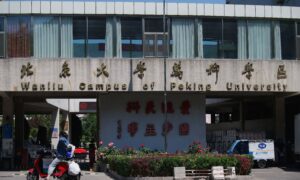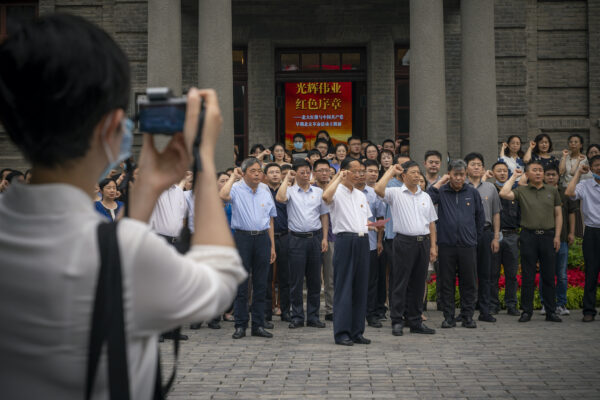Translator of Mao’s Writings Among Peking University Academics Who Have Died of ‘Illness’ During COVID Surge
As COVID-19 sweeps through China, more than a dozen of professors at Peking University are reported to have died of “illnesses.”Fan Hefang, an associate professor at the Institute of Foreign Languages at Peking University, is among those who passed away. According to an obituary released by the academic institution on Dec. 21, Fan died in Beijing two days before at the age of 93 after his illness failed to respond to medical treatment. As with most recent death announcements reported by the Chinese news media, it does not specify what kind of disease it was. The obituary said that Fan has long been engaged in Thai language teaching, textbook compilation, and other relevant research at Peking University. He served as an interpreter for the Thai delegation on certain occasions. Fan was also involved in the translation, touch-up, and finalization of the Thai edition of the Selected Works of Mao Zedong (Volumes 1-5) and Mao’s poetry. Mao’s communist ideology greatly influenced China, Southeast Asian countries, and much of the world to varying degrees. Born in Thailand in 1929, Fan came to China in December 1953 and joined the Department of Oriental Languages at Peking University in January 1954, where he was promoted to associate professor in January 1980 and retired in January 1987. Visitors take an oath in front of a communist flag (not seen) at the entrance of Peking University’s Red Building, where a new exhibition has then set up as part of the 100th anniversary of the Communist Party of China, on June 30, 2021. (Andrea Verdelli/Getty Images) The number of elderly people in Beijing who died from chronic illnesses and complications after contracting COVID-19 increased dramatically, especially with the sudden lifting of the lengthy zero-COVID quarantine restriction in early December. Multiple Chinese news media confirmed dozens of elderly scholars passing away due to incurable “illness,” many of them from Peking University, which is located in the capital city, the power center of the ruling Chinese Communist Party (CCP). Cao Fengqi, CCP member, a retired professor, and economist at Peking University’s Guanghua Management Institute, died on Dec. 21 at the age of 77 due to “an unsuccessful medical treatment.” Yang Gen, CCP member, and the first director of the Institute of Ceramic Archaeology of Peking University, died on Nov. 30 at the age of 89. Li Guipei, CCP member and professor of the Department of Korean Language and Culture at the School of Foreign Languages of Peking University, died on Nov.16 at the age of 95. Zhou Zengquan, Peking University School of Life Sciences, former Dean, and physiologist, died on Nov. 13 at the age of 86. In addition, among the Peking University professors who recently passed away were Feng Shihui from the Chinese Language Department; Zhao Guangwu from the Department of Philosophy; Ding Anru from the Foreign Languages Department; Jia Meixian from the Archaeology and Liberal Arts; Tang Youqi, director of the Institute of Physical Chemistry, Wang Jianhua from the Department of Atmospheric and Marine Sciences, and Xie Qingkui from Government Administration Institute.

As COVID-19 sweeps through China, more than a dozen of professors at Peking University are reported to have died of “illnesses.”
Fan Hefang, an associate professor at the Institute of Foreign Languages at Peking University, is among those who passed away. According to an obituary released by the academic institution on Dec. 21, Fan died in Beijing two days before at the age of 93 after his illness failed to respond to medical treatment.
As with most recent death announcements reported by the Chinese news media, it does not specify what kind of disease it was.
The obituary said that Fan has long been engaged in Thai language teaching, textbook compilation, and other relevant research at Peking University. He served as an interpreter for the Thai delegation on certain occasions.
Fan was also involved in the translation, touch-up, and finalization of the Thai edition of the Selected Works of Mao Zedong (Volumes 1-5) and Mao’s poetry.
Mao’s communist ideology greatly influenced China, Southeast Asian countries, and much of the world to varying degrees.
Born in Thailand in 1929, Fan came to China in December 1953 and joined the Department of Oriental Languages at Peking University in January 1954, where he was promoted to associate professor in January 1980 and retired in January 1987.

The number of elderly people in Beijing who died from chronic illnesses and complications after contracting COVID-19 increased dramatically, especially with the sudden lifting of the lengthy zero-COVID quarantine restriction in early December.
Multiple Chinese news media confirmed dozens of elderly scholars passing away due to incurable “illness,” many of them from Peking University, which is located in the capital city, the power center of the ruling Chinese Communist Party (CCP).
Cao Fengqi, CCP member, a retired professor, and economist at Peking University’s Guanghua Management Institute, died on Dec. 21 at the age of 77 due to “an unsuccessful medical treatment.”
Yang Gen, CCP member, and the first director of the Institute of Ceramic Archaeology of Peking University, died on Nov. 30 at the age of 89.
Li Guipei, CCP member and professor of the Department of Korean Language and Culture at the School of Foreign Languages of Peking University, died on Nov.16 at the age of 95.
Zhou Zengquan, Peking University School of Life Sciences, former Dean, and physiologist, died on Nov. 13 at the age of 86.
In addition, among the Peking University professors who recently passed away were Feng Shihui from the Chinese Language Department; Zhao Guangwu from the Department of Philosophy; Ding Anru from the Foreign Languages Department; Jia Meixian from the Archaeology and Liberal Arts; Tang Youqi, director of the Institute of Physical Chemistry, Wang Jianhua from the Department of Atmospheric and Marine Sciences, and Xie Qingkui from Government Administration Institute.












